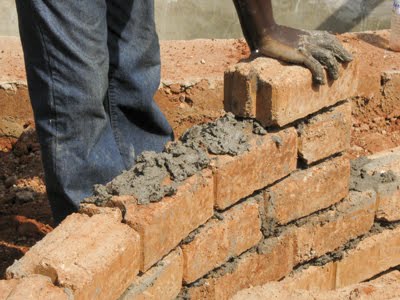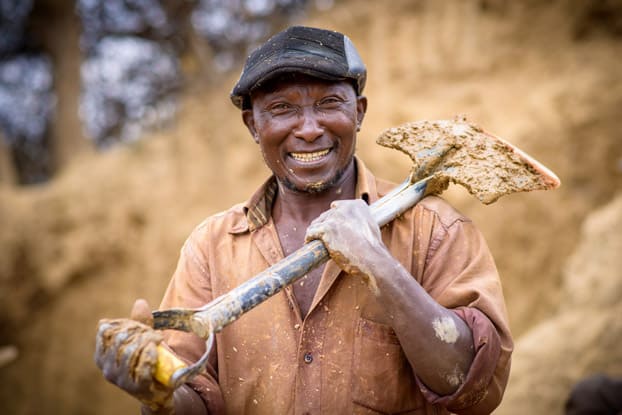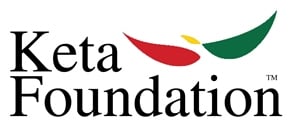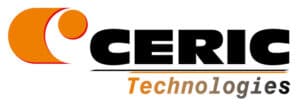Keta Foundation - What We Do
Operation red gold
The Ghana Sustainable Brick-Based Affordable Housing Program
Background
 Affordable housing everywhere is a basic human right. It is fundamental to human dignity, physical and mental health and overall quality of life. This seemingly simple foundation of free societies is, however, enveloped in complexity, and its achievement requires not just resolution, creative planning and important financial resources but also optimum use of latent resources, transformed by state-of-the-art technology and machines into finished building materials. Problems associated with affordable housing in Ghana, have overwhelmed generations of government, and despite good intentions, little has been done to solve them.
Affordable housing everywhere is a basic human right. It is fundamental to human dignity, physical and mental health and overall quality of life. This seemingly simple foundation of free societies is, however, enveloped in complexity, and its achievement requires not just resolution, creative planning and important financial resources but also optimum use of latent resources, transformed by state-of-the-art technology and machines into finished building materials. Problems associated with affordable housing in Ghana, have overwhelmed generations of government, and despite good intentions, little has been done to solve them.
With a current housing deficit estimated at one million, seven hundred thousand (Source: Ghana Business News, May 23, 2013), the shortage in Ghana, if not addressed today with effective measures, will assume gigantic, truly insoluble dimensions. Demographics reveal a population in which 37.3% are under 14 years of age. By 2025, many of these young people will have married and will be seeking shelter for their families. An estimated total of six million homes will be needed, compared with 3.7 million households documented in 2000. When the 3% dilapidation rate of existing housing is factored in, Ghana is faced with building four million homes, or 160,000 per year until 2025. (Source: United Nations Study published in the Daily Graphic, 6 October 2009)
Need
Ghana’s traditional cement-based house building philosophy –a major source of revenues for powerful vested interests – is outdated, inappropriate and prohibitively expensive. If this philosophy is imposed on the affordable housing program, reliance on cement would soon exceed Treasury resources. The price of Ordinary Portland Cement (OPC), primarily an expensive import from China, has skyrocketed by over 500% in five years. That price increases are chronic is shown by a recent article: “A bag of cement, which hitherto sold between GH¢12.50 and GH¢13.00, is now selling between GH¢15.00 and GH¢16.00 and it is feared that the price could go to about GH¢20.00 soon, if nothing is done about the situation.” (Source: The Chronicle, May 31, 2013)
From the UAE to South America, construction has ground to a halt due to lack of cement. The shortage is global, and, according to industry experts is of a long-term, if not permanent, nature. Despite plans to expand cement production in Ghana, and heightened imports from the Cote d’Ivoire, it is unlikely that the resultant quantities would be sufficient– even if dedicated to affordable housing instead of their intended use in industrial and commercial building projects. An alternative sustainable and affordable Ghanaian building resource offers the elegant solution to the housing shortage – indigenous clay, to be converted into finished bricks and tiles. Brick and ceramic tile roofing on their own, will not, short term, solve the housing shortage, but will be a vital first step in doing so, through mobilizing native human and mineral resources.
Solution
 Operation Red Gold© is the most important affordable housing program in the history of Ghana. The past is strewn with examples of unrealistic, expensive programs, tackled without adequate expertise and resources; lacking vision and pragmatism; suffering from exploitation by individuals and vested interests; engaging in shoddy construction techniques with inappropriate, inferior materials – programs that were seemingly automatically abandoned in an unfinished state by each new regime.
Operation Red Gold© is the most important affordable housing program in the history of Ghana. The past is strewn with examples of unrealistic, expensive programs, tackled without adequate expertise and resources; lacking vision and pragmatism; suffering from exploitation by individuals and vested interests; engaging in shoddy construction techniques with inappropriate, inferior materials – programs that were seemingly automatically abandoned in an unfinished state by each new regime.
Operation Red Gold© is a long-term- indeed, permanent – sustainable program that will increasingly offer affordable high-quality housing that will survive centuries, to the citizens of Ghana, as new ceramic building material manufacturing facilities come on line. It is a program based on industrial-scale solutions to the housing problem. Artisan-scale solutions are unrealistic and symbolic – incapable of making a significant contribution when faced with the scope of the Ghanaian housing deficit. A percentage of brick and tile production (TBD) would be dedicated to the private sector for real estate including residential, hotel and industrial construction, as well as export sales. The subsequent profitability will make Operation Red Gold more attractive to investors.
To attack the problem realistically and effectively means a kick-start of ceramic building material production, through the installation of one major manufacturing center at Bomigo, and an additional three small regional centers at Accra, Kumasi and the West Coast – each consisting of a brickyard and a roofing tile factory. The time frame, from signatures on contracts to fully functioning production, is estimated at approximately 18 – 24 months. This means that approvals, guarantees, governmental and other support should be obtained as soon as possible.
The clock is ticking. To meet the housing needs of Ghana as defined by the United Nations means building 18 new affordable houses every hour of the day until 2025. Clearly, this goal has not been met, and the housing deficit has grown even more critical. To date, Ghana has only managed to construct about 41,000 houses per year, or a total of 370,000 since 2000. This leaves an annual deficit of 120,000 each year over the past nine years, or a total of one million as of 2009. (Source: Daily Graphic, 6 October 2009)
Team
 Keta Foundation
Keta Foundation
Keta Foundation is working in collaboration with NHP-Echo and through partnership with Ceric Technologies to facilitate local activities.
Gavin P. Smith, Executive Director of the Keta Foundation, holds a Master of Global Management with distinction from Thunderbird School of Global Management; an MBA from the College of William & Mary Mason School of Business; and a BA in History from Wake Forest. A global professional and consultant with 20 plus years of experience in digital marketing, award-winning broadcasting and journalism, Gavin is also Executive Consultant to Freedom University Keta.
 Norris Hill & Partners
Norris Hill & Partners
NHP-Echo Ltd. is a cutting edge Ghanaian corporation, headquartered in Ho, Volta Region, the result of a fusion of Norris Hill & Partners (founded 2006) and Echo Contract Works Ltd., incorporated over 40 years ago by distinguished Chairman, Crossly K. Addor. Echo, a pioneer in the construction, civil engineering and plumbing industries, was a key factor in Volta Region infra-structure development.
Fortune Norris Addor – Fortune’s apprenticeship took place in Echo Contract Ltd, a leading Ho, Volta Region, road building, residential construction and engineering company, founded by his father, Crossly K. Addor in the 1970s. He earned a B.Sc. in Business Management from the University of Ghana in Accra, followed by Business Studies at MSBM, in London, before joining a French high tech energy company as African Development Manager. Fortune, co-founder of Freedom University Keta, represents Norris Hill & Partner as Managing Director in Africa.
Michael Flannery – Michael studied languages & economics at the universities of Vienna, Heidelberg & the U.S. Navy Intelligence School. He took part in seminars under Nobel Prize winner, William Faulkner at the University of Virginia and studied under Cyrus Hoy at Vanderbilt University. A graduate of Thunderbird School of Global Management, he has held directorships in international consumer products, design & advertising corporations. His historical work, Golf Through The Ages: 600 Years of Golfing Art, is the standard reference for sporting art & European ball games, 1120 – 1890. He is a Partner in Norris Hill & co-founder of Freedom University, Keta.
Ceric Technologies
 Partnership with Ceric Technologies, world-leader in the production of turnkey plants for the manufacture of ceramic building materials including bricks and tiles, offers a sustainable solution for virtually permanent constructions based on the exclusive use of Ghana’s human and native resources (clay). Ceric will manufacture an initial turnkey brick plant, to be installed by Norris Hill & Partners in the Volta Region of Ghana, 2016. Ceric scientists, engineers and architects have developed superior hollow bricks that reduce weight, increase speed of construction and reduce the use of cement by nearly 90% – a vital saving on imported, expensive Portland cement.
Partnership with Ceric Technologies, world-leader in the production of turnkey plants for the manufacture of ceramic building materials including bricks and tiles, offers a sustainable solution for virtually permanent constructions based on the exclusive use of Ghana’s human and native resources (clay). Ceric will manufacture an initial turnkey brick plant, to be installed by Norris Hill & Partners in the Volta Region of Ghana, 2016. Ceric scientists, engineers and architects have developed superior hollow bricks that reduce weight, increase speed of construction and reduce the use of cement by nearly 90% – a vital saving on imported, expensive Portland cement.
Ceric adapts to the industrial evolutions, the normative and regulatory evolutions, the evolutions of its time to guarantee the success and the durability of its customers’ activities by means of customized solutions. Those solutions are always worked out in partnership with its customers who trust the company, by means of the quality and the modernity of its equipment, its secured innovations, its expertise, and its aptitudes to guarantee services and a constant and effective follow up – “as the total commitment of CERIC towards its customers is their guarantee to be performing over time.”
Support
Norris Hill & Partners has been appointed to develop and manage the facility in collaboration with its French partner, Ceric Technologies, the world leader in ceramic building material technology and customized turnkey plants for the production of bricks and tiles. (See: TV3, Press Release by His Majesty Togbi Sri III, Royal Palace, Keta, 7 May, 2013).
Key Success Factors
Allowing two years from the date of commissioning to full production of the final plant in Year V (calendar 2020), by 2023, Ghana would have a ceramic building material production capacity of 60 million bricks and 90 million roofing tiles from the major factories, and 52 million bricks and 75 million tiles from the Regional factories for a consolidated total of 112 million bricks and 165 million tiles, a substantial shortfall in the number of bricks required for 160,000 homes (417.600,000); but on target for the required number of roofing tiles (156,800,000).
Conclusion
The problems confronting Ghana in the Affordable Housing sector will not go away. On the contrary, as the population grows, the challenge to the government to provide a roof over the heads of needy families grows apace. Funding and resources must be found to create millions of homes that though their quality, comfort and permanence, meet the needs of the people in a manner that respects their rights and dignity.
Each new house in Operation Red Gold© is a statement of the government’s awareness of the problem and its commitment to finding appropriate solutions. It is also a message of hope and encouragement to those living in slums and squalid shelters. As the Canadian philosopher Marshall McLuhan famously noted: “The medium is the message”. An attractive house made of sturdy bricks and ceramic roofing tiles – one that that will be standing for centuries as countless generations of residents enjoy its comforts and protection – is a resounding, meaningful message, a statement about permanence and social betterment. It serves as well, to bring distant classes of the same democratic society closer together.
Operation Red Gold© homes will introduce a new awareness of what is possible– a contagious message of hope and optimism.
Norris Hill & Partner is proud to have developed the concept of Operation Red Gold© and, in tandem with Ceric Technologies and other international partners, to be able to provide the technology, and solutions that can convert native resources to affordable material to build these homes.. This is a vital program for today and future generations.
With key partners, government support and funding, we will make Operation Red Gold© – the dream of millions – come true.
“The strength of a nation derives from the integrity of the home.”
Kong Qiu (Confucius: 551BC – 479BC)
